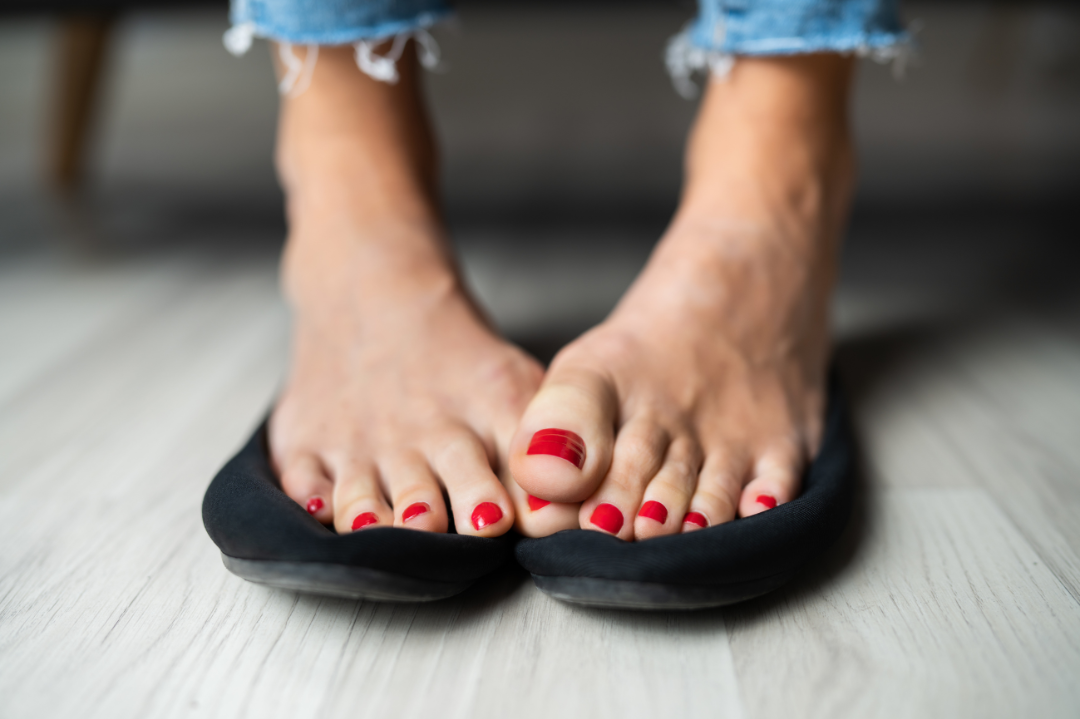
Jump to section
Feeling like your feet are constantly sweaty and having to frequently change socks throughout the day can feel frustrating for anyone,
leaving them wondering if that’s normal, or if their feet sweat more than others. In many cases, the answer is that you may have a
condition called hyperhidrosis, also known as sweaty feet.
The soles of our feet contain a lot of sweat glands - approximately 250,000 between both feet. Sweating through these
glands in our feet is typically a completely normal and effective way of our body working to regulate its temperature. Unfortunately, for a
small percentage of Australians, the release of sweat through the glands in our feet doesn't just happen during exercise or when we're
feeling excessively hot, but occurs constantly throughout the day.
The cause behind having constantly sweaty feet hasn't been pinpointed in research, but is thought to be an inherited (genetic) problem where the sweat glands are overactive. This means that, unfortunately, some people will just produce more sweat than others. Hormonal changes or imbalances, stress, anxiety and emotional disturbances can also affect sweat production, as well as having the foot be under strain or fatigued throughout the day. Generally speaking, the amount you sweat through your feet can also be increased by exercise and spending long days in hot or enclosed shoes.
Alongside the excess sweating that can lead to you feeling damp in your shoes and socks throughout the day, your feet may feel like they’re slipping inside your shoes, your skin may have a white ‘wet’ appearance, you may develop foot odour radiating from your feet or footwear as a result, and you may be more vulnerable to infections such as Athlete’s foot and fungal nail infections. And of course, there are the emotional side effects too. Having constantly sweaty (and potentially smelly) feet can cause much embarrassment and anxiety, leaving people to feel socially isolated, especially if experiencing it at a young age.
Visiting a podiatrist when you have excess foot sweating can help you rule out other conditions that can occur simultaneously like Athlete’s foot, or have them treated if present. Your podiatrist can then run you through a series of foot health and care tips to help you manage the excess sweating, such as:
If the problem is severely interfering with your quality of life or physical or emotional health, we can also refer you for a consultation to discuss specialised treatments such as prescription medications, botox injections in the feet or electrical stimulation that may help.
Why do my feet sweat even when cold?
If your feet are sweating even when you’re cold, you may have hyperhidrosis, be experiencing stress and anxiety which may be
triggering adrenaline (which can increase sweating), you may be wearing shoes or socks made of non-breathable materials that are causing
them to sweat, or you may have just gone from one extreme temperature to another (such as coming indoors from cold temperatures outdoors)
which can cause sweating as your body tries to regulate its temperature.
Is there a cure for hyperhidrosis in the feet?
No, hyperhidrosis does not have a distinct “cure”, but there are various treatment options available like those we’ve
mentioned to help reduce your sweating and help you live more comfortably.
Does diabetes cause sweaty feet?
Yes, diabetes does have the potential to increase the sweating that you experience in your feet. This is because constantly high blood sugar levels can damage the nerves in the feet that control the sweat glands, causing them to become overactive.
| Monday | 7:40am - 6:00pm |
| Tuesday | 7:40am - 6:00pm |
| Wednesday | 7:40am - 6:00pm |
| Thursday |
7:40am - 6:00pm |
| Friday | TEMP CLOSED |
| Saturday | CLOSED |
| Sunday | CLOSED |
Ground Floor, 344 Queen Street,
Brisbane City QLD 4000
| Monday | 7:40am - 6:00pm |
| Tuesday | 7:40am - 6:00pm |
| Wednesday | 7:40am - 6:00pm |
| Thursday |
7:40am - 6:30pm |
| Friday | 7:40am - 5:00pm |
| Saturday | 7:40am - 4:30pm |
| Sunday | CLOSED |
Newmarket Village, 114/400 Newmarket Rd, Newmarket QLD 4051